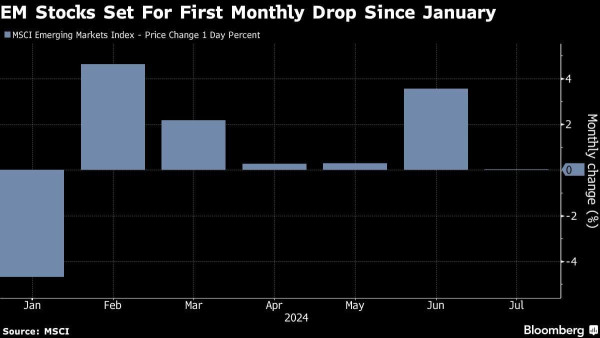Emerging assets climb as traders expect Fed to signal rate cuts
Emerging-market equities and currencies climbed on expectations the Federal Reserve to leave interest rates unchanged on Wednesday, but nod toward a cut in September, boosting risk appetite.
MSCI’s index for stocks in developing nations rose the most in three weeks, partially buoyed by earnings and a rally in Chinese shares as weak data fueled hopes for stimulus. Still, the gauge is set to post its first monthly losses since January.
A similar index for emerging currencies also gained, with 20 strengthening against the dollar out of 23 currencies tracked by Bloomberg.
The strength in currencies were driven by the “anticipation of a dovish Fed hold as well as general dollar weakness,” said Win Thin, global head of markets strategy at Brown Brothers Harriman.
Central bankers from Brazil, Colombia and Chile are also due to meet to set rates in a region that has already moved toward easing. Brazil is expected to keep rates steady, Chile is forecast to cut by a quarter-point, and Colombia is likely to deliver a half-point drop.
 EM stocks set for first monthly drop since January
EM stocks set for first monthly drop since January
Separately, Israel’s shekel headed for its biggest three-day selloff in two years as traders worried the killing of Hamas political leader Ismail Haniyeh on Iranian soil raises the danger of a broader Middle East war. The country’s dollar bonds were the worst performers in emerging markets, according to data compiled by Bloomberg.
In Sri Lanka, the International Monetary Fund will conclude its visit to Colombo on Aug. 1, as the country awaits its decision on whether a deal with private creditors is compliant with an analysis of debt sustainability.